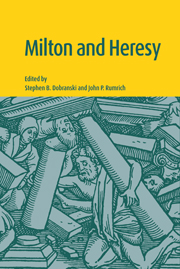Book contents
- Frontmatter
- Contents
- List of contributors
- Acknowledgments
- Abbreviations
- Introduction: Heretical Milton
- PART I HERETICAL THEOLOGY
- 1 Milton on heresy
- 2 Milton's antiprelatical tracts and the marginality of doctrine
- 3 How radical was the young Milton?
- PART II HERESY AND CONSEQUENCES
- PART III HERESY AND COMMUNITY
- PART IV READERS OF HERESY
- Index
2 - Milton's antiprelatical tracts and the marginality of doctrine
Published online by Cambridge University Press: 10 October 2009
- Frontmatter
- Contents
- List of contributors
- Acknowledgments
- Abbreviations
- Introduction: Heretical Milton
- PART I HERETICAL THEOLOGY
- 1 Milton on heresy
- 2 Milton's antiprelatical tracts and the marginality of doctrine
- 3 How radical was the young Milton?
- PART II HERESY AND CONSEQUENCES
- PART III HERESY AND COMMUNITY
- PART IV READERS OF HERESY
- Index
Summary
The place of this essay in a book on Milton and heresy may seem superficially paradoxical, because I shall argue that Milton's earliest radical prose deflects the then crucial controversies about Laudian doctrinal innovation away from issues of belief and toward issues of practice, of discipline, in ways that seek to marginalize doctrine. However, my thesis is that this marginalization is not because Milton is uninterested in doctrine, but because he probably subscribes, as early as 1641, to views deemed heretical by the middle ground of Puritan opinion. His silence is an attempt to win some space for heterodoxy from Presbyterian Calvinism and to site antiprelaticism in anticlericalism.
Thus, the essay explores Milton's developing notion of what may be tolerated, and re-appraises what he has to say about the characteristic practices and beliefs of what is customarily termed Laudianism and, to a less extent, of the sects, in the context of recent historical discussions focused on the place of religious discord in the origins of the English Civil War.
John Morrill has forcefully argued that, of all the impulses driving opposition to the personal rule of Charles I and precipitating open conflict, the determining factor was dissatisfaction with the Caroline church:
in the hectic early days of the Long Parliament, there were three quite distinct and separable perceptions of misgovernment or modes of opposition – what will be called the localist, the legal-constitutionalist, and the religious. One man could hold two or three of them; but many did not do so … the localist and the legal-constitutionalist perceptions of misgovernment lacked the momentum, the passion, to bring about the kind of civil war which England experienced after 1642. […]
- Type
- Chapter
- Information
- Milton and Heresy , pp. 39 - 48Publisher: Cambridge University PressPrint publication year: 1998
- 3
- Cited by

